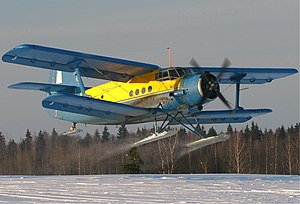Antonov An-2 Colt
| An-2 | |
|---|---|
 |
|
| An-2R on skis allowing operations in the snow | |
| Role | Agricultural and utility aircraft |
| Manufacturer | Antonov |
| Designer | Oleg Antonov |
| First flight | 31 August 1947 |
| Status | Series production may still continue in China as the Shijiazhuang Y-5; engine refitting project underway |
| Primary users |
Soviet Union North Korea China Many others |
| Produced | 1947–2001 |
| Number built | 18,000+ |
| Variants | Antonov An-3 |
The Antonov An-2 (Russian nickname: "Annushka" or "Annie"; "kukuruznik" - corn crop duster; USAF/DoD reporting name Type 22, NATO reporting name Colt.) is a Soviet mass-produced single-engine biplane utility/agricultural aircraft designed and manufactured by the Antonov Design Bureau beginning in 1946. Its remarkable durability, high lifting power, and ability to take off and land from poor runways have given it a long service life. The An-2 was produced up to 2001 and remains in service with military and civilian operators around the world.
The An-2 is used as a light utility transport, parachute drop aircraft, agricultural work and many other tasks suited to this large slow-flying biplane. Its slow flight and good short field performance make it suited for short, unimproved fields, and some specialized variants have also been built for cold weather and other extreme environments. The Guinness Book of World Records states that the 45-year production run for the An-2 was for a time the longest ever for any aircraft — and challenging the well over two decades-long run of the much lighter, late-1920s origin Polikarpov Po-2 biplane it was intended to replace — but the An-2's production duration run record was itself recently exceeded by the four-turboprop-engined, 1954-origin Lockheed C-130 Hercules military transport.
The Antonov An-2 was designed to meet a 1947 Soviet Ministry of Forestry requirement for a replacement for the much lighter, largely wooden-airframed Po-2, which was used in large numbers in both agricultural and utility roles. Antonov designed a large single bay biplane of all-metal construction, with an enclosed cockpit and a cabin with room for seats accommodating twelve passengers. The first prototype, designated SKh-1 and powered by a Shvetsov ASh-21 radial engine, flew on 31 August 1947. The second prototype was fitted with a more powerful Shvetsov ASh-62 engine, which allowed the aircraft's payload to be significantly increased from 1,300 to 2,140 kg (2,870 to 4,720 lb), and in this form it was ordered into production.
...
Wikipedia
